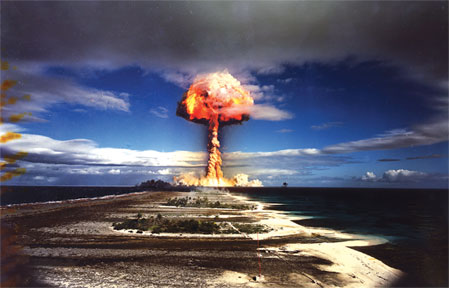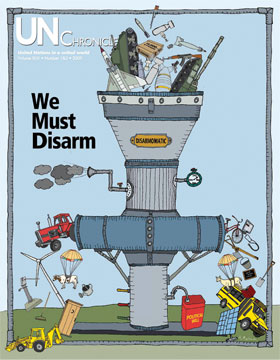|
UN Disarmament Week from Oct 24 to 30:
For a world free of nuclear weapons
BY Pramod DE SILVA
 Disarmament has remained a buzzword for at least eight decades – ever
since the First World War ended, bathing the world in blood. However,
the world has seen a sharp increase in weapons stockpiles since then.
There was, in fact, one more world war which saw the detonation of two
nuclear warheads that killed hundreds of thousands of people. Disarmament has remained a buzzword for at least eight decades – ever
since the First World War ended, bathing the world in blood. However,
the world has seen a sharp increase in weapons stockpiles since then.
There was, in fact, one more world war which saw the detonation of two
nuclear warheads that killed hundreds of thousands of people.
Today, the world is sitting on a pile of weapons that can destroy it
many times over. The nuclear powers (and other countries that have not
officially declared their nuclear capability) have long-range nuclear
missiles that can annihilate any given city in minutes. Apart from these
nuclear Weapons of Mass Destruction, there are destructive conventional
weapons and munitions that are used in major conflicts around the world
and stored for possible use by both State and non-State parties.
This is why it is essential to disarm – in other words, eliminate or
reduce the stocks of weapons amassed by various countries and other
parties. Disarmament has become crucial for world peace and conflict
resolution. The UN will discuss this topic during the forthcoming
Disarmament Week from October 24 to 30, which is designed to raise
awareness on the need for reducing weapons stockpiles and their use
globally. An impetus should be given to significant steps towards
disarmament such as US and Russia’s ratification of the New START Treaty
in 2010/2011.
This year, the UN has highlighted the danger of nuclear weapons
passing into the wrong hands – international terror groups. The
consolidation of strong international mechanisms is vital to combat
nuclear terrorism, senior United Nations officials have stressed,
warning that countries must urgently act to tackle one of today’s most
serious global threats.
 “The prospect of terrorists acquiring nuclear materials is one of the
most unnerving threats imaginable. Yet some have already stated their
hopes of obtaining nuclear weapons. Still others may be working in the
shadows to achieve this goal,” UN Secretary General Ban Ki-moon told the
high-level meeting on countering nuclear terrorism, held on the
sidelines of the 67th Sessions of the UN General Assembly. “The prospect of terrorists acquiring nuclear materials is one of the
most unnerving threats imaginable. Yet some have already stated their
hopes of obtaining nuclear weapons. Still others may be working in the
shadows to achieve this goal,” UN Secretary General Ban Ki-moon told the
high-level meeting on countering nuclear terrorism, held on the
sidelines of the 67th Sessions of the UN General Assembly.
Nuclear genie
“We must use all our tools to contain this nuclear genie. As we
confront other challenges relating to nuclear disarmament, we cannot
allow these arms to proliferate to non-State actors or terrorists,” he
said.
While the International Convention for the Suppression of Acts of
Nuclear Terrorism and Security Council Resolution 1540 enhances
international cooperation to prevent nuclear terrorism and prosecute and
punish perpetrators of such acts, more needs to be done in terms of
Resolution 1540 that imposes binding obligations on all States to
establish controls preventing the proliferation of nuclear, chemical and
biological weapons, and their means of delivery.
The Nuclear Non-Proliferation Treaty is another important pact aimed
at minimising the spread of nuclear weapons. More countries should
endorse these landmark conventions and resolutions and work with the UN
International Atomic Energy Agency to counter the nuclear threat.
As a UN nuclear expert has stated, terrorists will exploit the
weakest link in any security system and there should be a global
response. Terrorists need not even take the full nuclear route to make
their presence felt - there is the possibility of terrorists detonating
a “dirty bomb” using conventional explosives and a quantity of nuclear
material, which would still cause widespread destruction.
These issues will gain more attention at the International Conference
on Nuclear Security, due to take place in Vienna next July. The Campaign
for Nuclear Disarmament organised an international conference in London
on October 13, drawing together anti-nuclear activists from Britain and
the Middle East which discussed similar issues.
|

An aircraft carrier |
There is general consensus that the international community should
explore the possibility of evolving a nuclear weapons convention that
could be the final arbiter for the storage and use of nuclear weapons.
The Non Aligned Movement, of which Sri Lanka is a leading member,
recently expressed support for total nuclear disarmament.
Conventional weapons
While there is no doubt that nuclear weapons – in ‘right’ or wrong
hands form the biggest danger, one cannot dismiss the damage and loss of
lives caused by conventional weapons and small arms that are being used
in conflicts around the world. Terrorism in this country ended three
years ago, but the same cannot be said about scores of violent hotspots
that continue to feed the world’s arms industry. As often pointed out by
the UN, even a fractional cut in the defence spending by rich nations
can resolve half of the developing world’s problems through additional
funding and resources. The term disarmament must necessarily include
this aspect as well.
While disarmament in today’s context refers primarily to nuclear
weapons, the term ‘arms control’ has gained traction in recent years to
describe the need to reduce conventional weapons stocks. One main way in
which the use of weapons can be discouraged is conflict resolution. If
peace can be established in at least a few of the over 50 conflict zones
around the world, the use of weapons can be contained.
The numbers are indeed alarming. It is estimated that yearly, over
1.7 trillion dollars are spent on weapons and military apparatus
worldwide (small arms, land vehicles, aerospace systems, defence
satellites and naval systems). This amounts to 2.7 percent of the
world’s GDP. The ‘good news’ is that this represents a decline from 1990
when military expenditure made up four percent of the world GDP.
The combined arms sales of the top 100 largest arms producing
companies amounts to more than US$ 300 billion annually. Ironically,
some of the most peaceful countries are among the world’s biggest arms
exporters. Conversely, many developing countries are among the biggest
arms importers.
This expenditure is far too much. As we have said before, even a
fraction of this expenditure can be a lifeline to the Least Developed
Countries and other developing countries. Many world leaders and civil
society campaigners have expressed remorse about the apparent lack of
political will to address the issue of disarmament. This does not augur
well for world peace. The world needs a clear commitment from its
leaders to end the era of nuclear weapons and resolve deadly conflicts.
|


